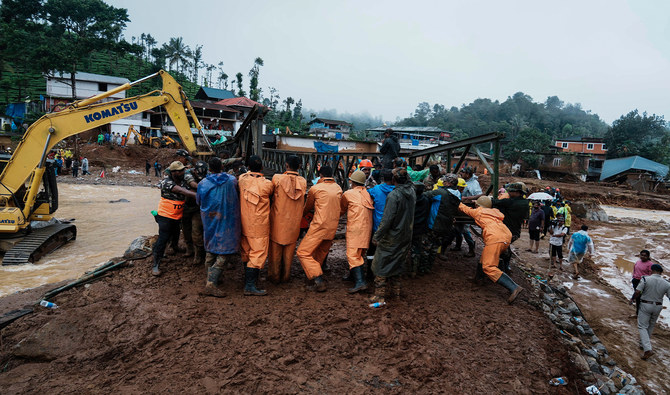In India and China, torrential rains have killed more than 200 people in the past week. Three others died in Pakistan. Widespread flooding has been reported in North Korea near the border with China with no word on whether anyone died.
This time of year is monsoon and typhoon season in Asia, and climate change has intensified such storms. Heavy rains have triggered landslides and flooding, devastating crops, destroying homes and taking lives.
Historical data shows that China is having more extremely hot days and more frequent intense rains, according to a report released last month by the China Meteorological Administration, which forecasts more of both in the coming 30 years.
Governments have launched disaster prevention plans to try to mitigate the damage. Rescue teams scramble to evacuate people ahead of approaching storms and deliver relief goods by helicopter to cut-off areas. China has deployed drones for emergency communication in rain-prone provinces.
Sometimes it isn’t enough, as the tragic consequences playing out in Asia show.
India: 194 dead, 187 missing
Heavy rains sent torrents of mud and water through tea estates and villages in Kerala state in southern India early Tuesday, destroying bridges and flattening houses.
Hope of finding survivors has waned as the search entered its fourth day. Bodies have been found as many as 30 kilometers (20 miles) downriver from the main landslides.
The area is known for its picturesque tea and cardamom estates, with hundreds of plantation workers living in nearby temporary shelters. “This was a very beautiful place,” a shopkeeper said. “I used to visit here many times. ... Now there is nothing left.”
India regularly has severe floods during the monsoon season, which runs between June and September and brings rain that is crucial for crops.
China: 48 dead, 35 missing
Typhoon Gaemi was blamed for more than 30 deaths in the Philippines and 10 in Taiwan as it churned through the western Pacific last week, but it was still fatal after weakening to a tropical storm in China.
Rain drenched parts of inland Hunan province for several days. On Sunday morning, a mudslide slammed into a homestay house in a popular weekend spot, killing 15 people.
Elsewhere in Hunan, the bodies of three people were found on Monday, believed to be victims of another landslide. And authorities in nearby Zixing city announced Thursday that 30 people had died in floods, with 35 others missing.
One other death in China was apparently tied to the storm, a delivery driver on a scooter struck by falling tree branches during high winds in Shanghai.
China has recorded 25 major floods this year, the most since it began keeping statistics in 1998, the Ministry of Water Resources said this week.
North Korea: Damage, but no information on deaths
The tropical storm also generated heavy rain in northeast China on the border with North Korea, overflowing the Yalu River, which divides the two countries.
In North Korea, the rain flooded 4,100 houses, 3,000 hectares (7,400 acres) of farmland and many public buildings, roads and railways.
Its state media did not give information on deaths, though the nation’s leader Kim Jong Un implied there were casualties when he was quoted blaming public officials who had neglected disaster prevention, causing “the casualty that cannot be allowed.”
Military helicopters and navy and other government boats evacuated stranded residents. State TV aired footage showing Kim and other officials riding on rubber boats to examine the scale of the damage. The footage showed houses submerged in muddy waters with only their roofs visible.
On the Chinese side, state television showed excavators in rushing water trying to clear debris after a mudslide in Jilin province. One city near North Korea asked people living below the third floor to move higher as the Yalu River rose.
In Dandong, a large Chinese city along the river, rescuers evacuated residents in rubber dinghies on streets turned into virtual lakes. There were no reports of deaths.
Pakistan: 3 dead
Record rainfall in the city of Lahore flooded streets and left at least three people dead in Pakistan on Thursday. The deaths at the start of August came on top of 99 rain-related fatalities the previous month.
Some parts of Lahore recorded 353 millimeters (14 inches) of rain in a few hours, breaking a 44-year-old record. The rain was so heavy that it entered some hospital wards in the capital of Punjab province.
The victims included two children, one who drowned in a flooded street and another who fell from the roof of her house.

















